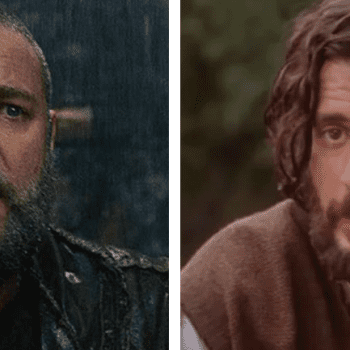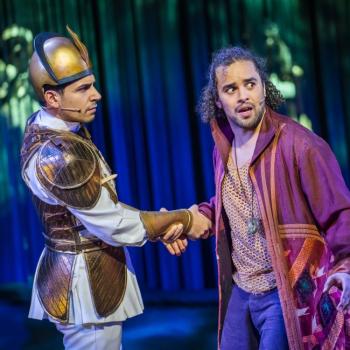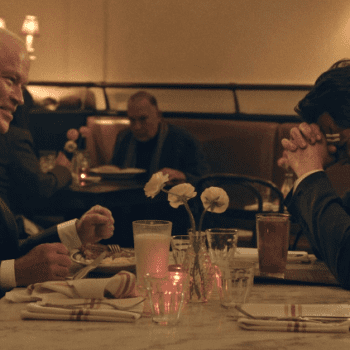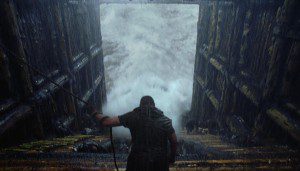 It’s tempting to say that Darren Aronofsky’s Noah has brought back the Bible epic. It’s certainly the first major live-action Bible movie to be produced by a Hollywood studio in decades. But the fascinating thing about this film is how utterly different it is from the Bible movies that came before it. Aronofsky has not revived the genre so much as he has utterly transformed it.
It’s tempting to say that Darren Aronofsky’s Noah has brought back the Bible epic. It’s certainly the first major live-action Bible movie to be produced by a Hollywood studio in decades. But the fascinating thing about this film is how utterly different it is from the Bible movies that came before it. Aronofsky has not revived the genre so much as he has utterly transformed it.
Unlike most Bible films, which take place within decidedly historical contexts, Noah is based on the earliest, most “mythic” chapters of Genesis, as well as some of the Jewish legends that have grown up around those chapters. Building on the ancient otherworldliness of these stories, Aronofsky has created a grounded yet somewhat fantastical environment that is, at times, strikingly reminiscent of the Lord of the Rings movies.
But the core biblical themes — of temptation, wickedness and punishment — are still there, and Aronofsky infuses the genre with his own personal style, not least in his use of haunting dream sequences and in his focus on a morally ambiguous protagonist.
Put it all together and you’ve got something quite unique.
I was fortunate enough to see this film a few weeks ago, and if there’s one thing I can say right now, it’s that I need to see it a second time. I’ve read so much about the movie over the last two years — including an early draft of the script — that I really think I need to see it again so that I can settle into it and watch it as a movie in its own right, without being distracted by all the preconceptions that come from speculating endlessly about what the movie might be like.
But here, for now, are my first impressions, grouped thematically.
A mix of the familiar and the unfamiliar. The filmmakers have said that they wanted to shake people’s expectations, and they certainly don’t waste any time getting right to it. The film hits you from its opening frames with a bold, disorienting mix of what you’d expect to see in a Bible film and what you probably wouldn’t expect, and this mix of the biblical and the not-quite-biblical carries on throughout the film.
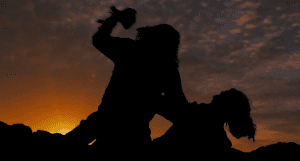 Title cards inform us that Adam had three sons — Cain, Abel and Seth — and that Cain was sheltered by mysterious beings known as “the Watchers” after he killed his brother Abel. The descendants of Cain went on to “devour” the world with their wickedness, using skills that were taught to them by the Watchers, while the descendants of Seth tried to defend and protect what is left of the world.
Title cards inform us that Adam had three sons — Cain, Abel and Seth — and that Cain was sheltered by mysterious beings known as “the Watchers” after he killed his brother Abel. The descendants of Cain went on to “devour” the world with their wickedness, using skills that were taught to them by the Watchers, while the descendants of Seth tried to defend and protect what is left of the world.
One of these descendants of Seth — the last of his line, we are told — is Noah, who we first see as a boy (played by Dakota Goyo) being instructed in the ways of his ancestors by his father Lamech (Marton Csokas). Lamech recites a list of Seth’s descendants, taken straight out of Genesis 5, and then he straps a sort of magic snakeskin to his arm that has something to do with a “birthright” that he wants to pass on to his son.
Full disclosure: I memorized the geneaology in Genesis 5 when I was 12 or so, and hearing someone recite it in a major Hollywood movie was a real treat — and that’s just one of many ways in which this film draws on biblical details that are ignored by most other Bible films. But I have to admit, the snakeskin puzzled me, partly because there’s no biblical basis for it and partly because it only comes up a couple more times later on in the film; take it out and the story would be more or less the same.
There are a few other details like this that flit through the film without much explanation, such as a brief flashback in which Noah’s grandfather Methuselah (Anthony Hopkins) wields a flaming sword against an army. I learned afterwards, from reading the production notes, that this moment was inspired by a passage in the midrash in which Methuselah slays thousands of demonic beings with a sword that has the name of God inscribed on it. That’s a fascinating bit of back-story, but without it, and without a more developed connection to the rest of this universe, the scene comes across as just a random bit of cool imagery.
Bold, stylish visuals. Still, it must be said that the film does have some very powerful images. And not surprisingly, given the nightmare sequences of Aronofsky’s earlier films, some of these images have an intensely dark, horrific quality.
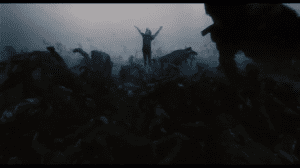 The adult Noah (Russell Crowe) is haunted by dreams and visions of a worldwide flood, nightmares in which he floats underwater while corpses drift past him and animals swim up towards a glowing rectangular box signifying the ark. Later, when the flood itself is well under way, we see waves crash against a not-yet-submerged mountain peak and the would-be survivors who cling to it, hoping in vain that the ark will rescue them.
The adult Noah (Russell Crowe) is haunted by dreams and visions of a worldwide flood, nightmares in which he floats underwater while corpses drift past him and animals swim up towards a glowing rectangular box signifying the ark. Later, when the flood itself is well under way, we see waves crash against a not-yet-submerged mountain peak and the would-be survivors who cling to it, hoping in vain that the ark will rescue them.
But there are beautiful images, too: awe-inspiring images of angels falling to Earth; of Adam and Eve walking hand-in-hand through the Garden of Eden, their bodies glowing with light so that we barely even notice their nudity; and of the creation of life itself as Noah tells his family the story of how God made the world before people ruined it.
And that’s before we get to the awesomeness of the ark itself. Inside and out, on dry land or bobbing in the waves, it’s a sight to behold: massive, imposing and really quite striking.
Not your typical hero. There’s been a lot of controversy over the fact that Noah, in this film, is not the likeable, even comedic, character that many people have come to expect from their Sunday School lessons, from nursery-school decorations, and from earlier films like John Huston’s The Bible: In the Beginning.
It could just as easily be noted that people who come looking for a straightforward fantasy film will find that Noah is not exactly the uncomplicated hero — the Aragorn or Frodo — that they might be expecting.
Instead, Noah is like a lot of other protagonists in Aronofsky films: he is haunted, driven, and so obsessed with his task that he is prepared to die for it — and to let others die as well.
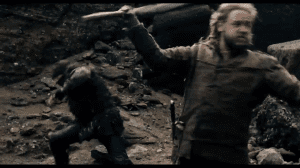 When we first meet him as an adult, living in isolation from the rest of humanity with his wife Naameh (Jennifer Connelly) and his three young sons, he already seems a bit stern. He chides his middle son Ham for plucking a flower needlessly — understandable, perhaps, given how rare such plants seem to be in this terrain — and he fights a few animal poachers to the death, partly in self-defense but also, as he puts it, in the name of “justice”.
When we first meet him as an adult, living in isolation from the rest of humanity with his wife Naameh (Jennifer Connelly) and his three young sons, he already seems a bit stern. He chides his middle son Ham for plucking a flower needlessly — understandable, perhaps, given how rare such plants seem to be in this terrain — and he fights a few animal poachers to the death, partly in self-defense but also, as he puts it, in the name of “justice”.
(It’s worth bearing in mind that, in the early chapters of Genesis, animals could be killed and placed on altars as sacrifices to God, but they were not meant to be eaten; God does not give humans permission to do that until after the Flood. So there is a biblical basis for Noah’s outrage at the treatment of animals in this film. That being said, I don’t believe the film shows Noah offering any sacrifices, either.)
When Noah gets the call to build his ark and save the animals, he repeatedly refers to these creatures as “the innocent”. And this assumption that animals are uniquely “innocent” — because they did not give in to sin and temptation like humans did — is what drives Noah for much of the film, to the point where he is willing to let people die and maybe even kill them himself to prevent humanity from ruining things all over again after the Flood.
Noah gets increasingly unlikeable in the film’s third act, in particular, when the Flood is well under way and his family is trapped aboard the ark. But of course — no spoilers here, if you’ve read your Bible — eventually the Flood ends and the family disembarks, and Noah is left to cope with his “survivor’s guilt” by drowning his memories in alcohol.
And this, I have to say, is actually one of my favorite sequences in the film. Other films have alluded to this part of the story, and often with a sly wink, as Noah insists that the drinks aboard the ark are there for medicinal purposes or whatever. But Aronofsky, at this point, really lets you sympathize with Noah and the toll the Flood has taken on him.
And unlike the Bible, which ends with Noah drunk and naked and, then, cursing his offspring through his hangover, Aronofsky goes on to offer a measure of hopeful reconciliation. The Noah we saw earlier in the film had his moments of warmth and tenderness, and Aronofsky allows him to show those qualities again.
Much of the film is dark, yes, and there are lingering unresolved questions when the credits roll, but darkness does not get the last word.
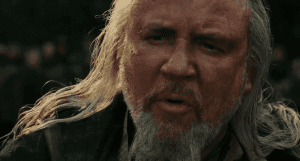 Tubal-Cain, the image of God, and the human will. The moral ambiguity of Noah, the character, has its counterpart — if not quite its mirror image — in the film’s villain, Tubal-Cain (Ray Winstone).
Tubal-Cain, the image of God, and the human will. The moral ambiguity of Noah, the character, has its counterpart — if not quite its mirror image — in the film’s villain, Tubal-Cain (Ray Winstone).
In the Bible, Tubal-Cain is little more than a descendant of Cain’s who happens to be one of the first people to forge certain metals. In the film, he is a self-proclaimed “king” who, upon discovering Noah’s ark and learning about the imminent Flood, decides to take the ark for himself — but first he needs to raise and equip an army to fight off the Watchers, who are now on Noah’s side. (More on that in a minute.)
Just as Noah is not always the most sympathetic of characters, Tubal-Cain is not entirely unsympathetic either. There is a particularly striking scene in which Tubal-Cain, on the eve of battle, asks why God won’t speak to him; after all, wasn’t Tubal-Cain made in God’s image too?
But you get the feeling that Tubal-Cain wouldn’t know how to listen even if God did speak to him; his entire life has been a selfish and violent one, and ultimately his appeal to the imago Dei becomes not a way of aligning himself with God’s will, but of puffing up his own.
Where Lamech taught Noah to care for creation, Tubal-Cain talks about subduing it, about dominating it. And when he rallies his troops by shouting “Men united are invincible!” it feels like a foretaste of the human arrogance that will go on to surface after the Flood, at Babel.
 The Watchers. One of the most intriguing elements in the entire movie is the Watchers, a group of angels who sided with humanity after Adam was expelled from Eden, and who gave Cain’s descendants the technical prowess with which they ruined they world.
The Watchers. One of the most intriguing elements in the entire movie is the Watchers, a group of angels who sided with humanity after Adam was expelled from Eden, and who gave Cain’s descendants the technical prowess with which they ruined they world.
In the Bible, these angels mated with human women and produced gigantic offspring, and there is a pretty compelling argument to be made that the Flood was sent primarily to eliminate these half-breeds. But in Aronofsky’s film, there is no inter-species sex — the film is controversial enough without that bit! — and the Watchers, rather than sire the giants, become the giants when they land on Earth, their luminescent forms almost entirely covered by the rocks that attach to their bodies when they hit the ground.
The form the Watchers take, then, is that of rock-giants, and their up-from-the-ground look, combined with their deep booming voices, is more than a little reminiscent of the Ents from The Lord of the Rings — especially when they wade into battle with Tubal-Cain’s men.
Why do the Watchers now fight the descendants of Cain, where once they had sheltered them? Because the descendants of Cain, having acquired the knowledge they wanted from the Watchers, betrayed the Watchers and tried to wipe them out.
The Watchers, now convinced that taking humanity’s side against God was a mistake, are initially reluctant to help any human beings. But when they hear that God has pronounced judgment against the world, and that Noah must build a boat to save at least some of the animals, they decide to help him as a sort of act of penance. And so, you might say, the film gives them a redemptive ark. (Sorry, I couldn’t resist.)
Hard questions. The film asks some pretty hard questions about the relationship between justice, mercy and righteousness, and I think it leaves things open-ended enough to allow for plenty of discussion and contemplation once the movie’s over.
 For one thing, it’s worth noting that none of the protagonists ever question God’s judgment, to the extent that they understand it. Methuselah, who seems righteous enough, not only agrees with God’s judgment but welcomes it — though he is open to the possibility of mercy and even intervenes miraculously to ensure that a merciful outcome is at least somewhat possible.
For one thing, it’s worth noting that none of the protagonists ever question God’s judgment, to the extent that they understand it. Methuselah, who seems righteous enough, not only agrees with God’s judgment but welcomes it — though he is open to the possibility of mercy and even intervenes miraculously to ensure that a merciful outcome is at least somewhat possible.
And when Noah’s wife and children protest against Noah’s own mercilessness, their anger is directed against him and what they perceive as his extreme interpretation of God’s will, rather than at God himself.
But the fact that Noah believes he must act violently to prevent the creation of new humans who will, themselves, act violently points to an ambiguity that lies at the very heart of the biblical story.
Yes, absolutely, people all have wickedness within themselves, and some are more overtly wicked than others. It is not at all hard to see why God might want to eradicate at least some human beings. But everyone? Including children and, indeed, the humans who were the victims of the other humans?
It’s not too hard to see why many people, including many Christians, prefer to see this story as a myth, as something that never actually happened; or why, alternatively, some Christians have proposed that God was still figuring out how to deal with his creation in those first generations after the Fall (as evangelical author Philip Yancey once put it, God “learns to be a parent” over the course of Genesis).
But I also think it can be fascinating, and instructive, to see Noah as the latest in a line of Aronofsky characters who pursue perfection even to the point of self-destruction.
Sometimes this self-destruction is presented positively, as when Hugh Jackman discovers that “death is the road to awe” in The Fountain (and note how he greets death with open arms just as one of the characters in Noah does); sometimes it’s more ambiguous, as when the psychologically tormented Natalie Portman dies happily at the end of Black Swan because her final dance was “perfect”; and sometimes there’s no upside to the self-destruction at all, as in Requiem for a Dream.
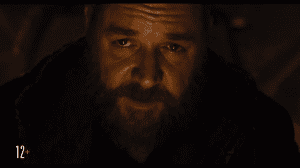 But coursing through all these films is a sense that perfection is ultimately unattainable, or that it is something we cannot actually live with, though we might touch it for a moment.
But coursing through all these films is a sense that perfection is ultimately unattainable, or that it is something we cannot actually live with, though we might touch it for a moment.
Connected to this notion of perfection is the notion of purity. In Pi, Aronofsky’s first film, a group of Jews who believe in a form of mysticism known as the Kabbalah come to believe that a number representing the name of God lives inside a mathematician’s head — and they tell him that the number is meant for them, not him, because he is not “pure”.
The mathematician balks at this, and tells them that they aren’t “pure” either — but there may be some merit to their words of warning, because the mathematician ultimately finds the activity inside his head too much to bear. In the end, he takes drastic measures to eradicate that number, along with the rest of his mathematical genius.
Like all of those characters, the Noah of Aronofsky’s film wants to find perfection. He wants the new world to be a new Eden. But he knows that humans will make a mess of it just as they did the first time, and so he’s prepared to let his family die out, rather than repeat the error of their ancestors.
And one of the questions that hangs over the film is whether Noah will let his drive for perfection get the best of him, or whether he will learn to make exceptions.
Mercy and forgiveness. For all the talk of judgment, the film makes some very powerful points about mercy and forgiveness — and it makes them visually, as well as verbally.
Without giving too much away, let’s just say that something unexpected happens when one character says, in the heat of battle, “My Creator, forgive me.”
And then, of course there is the climactic sign of grace, when God sends his first rainbow across the sky.
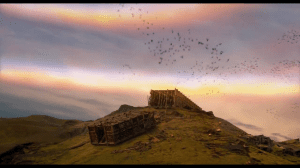 But there is also the question of whether we can forgive God. No one states it quite as bluntly as that. But when Noah’s wife confronts him over his plans to kill their grandchildren, she tells him, “When everyone died, I forgave you,” but she will not forgive him now.
But there is also the question of whether we can forgive God. No one states it quite as bluntly as that. But when Noah’s wife confronts him over his plans to kill their grandchildren, she tells him, “When everyone died, I forgave you,” but she will not forgive him now.
Think about that for a minute.
Naameh says she forgave Noah, and perhaps she can hold him directly responsible for the deaths of those whose cries they heard after the waters had already begun to rise. (I can’t remember if the movie makes this point, but in the graphic novel, Noah’s family does point out that those would-be survivors are “not soldiers. Just people.”)
But “everyone”? That suggests a comment on the Flood as a whole.
I don’t know how strongly I’d want to push this point, but it’s one of the many themes and concerns that the film leaves you thinking about.
Odds and ends. One of the reasons I want to see the film again — apart from taking in the sheer visual splendour of it all — is to see how the drama works, as drama. I wanted to see a little more of certain characters, or to understand better why some of them make the decisions that they do, but I was also scribbling notes furiously in the theatre, and that might have distracted me too much.
I do like the way this film imagines a slightly different set of natural laws for the antediluvian world, from the ancient pyrotechnics to the special incense that puts all the animals to sleep (but not, apparently, the humans).
Just for the record, I love how the creation sequence combines the basic narrative thrust of Genesis 1 with some elements of evolutionary theory.
And I love the way Methuselah, whose father Enoch predicted the end of the world if mankind continued to be corrupt, responds to Noah’s visions of a flood: “Water? Huh. My father said it would be fire.” Is the water itself a sign that God is beginning to dial back the justice a bit and permit a degree of mercy? Or is it a hint that an even greater, more final judgment awaits us all at some point in the future?
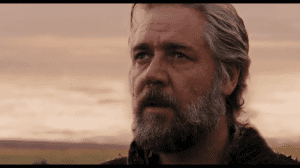 And to sum it all up… I am very grateful that this film exists — partly because it has the potential to bring back the Bible epic as a genre to be reckoned with for the first time in almost half a century, and partly because I have learned a bit more about the Jewish tradition while reading up on this film and its source material, and partly because it’s a dynamic piece of filmmaking in its own right, but also because the film takes the Bible seriously and asks us to do the same.
And to sum it all up… I am very grateful that this film exists — partly because it has the potential to bring back the Bible epic as a genre to be reckoned with for the first time in almost half a century, and partly because I have learned a bit more about the Jewish tradition while reading up on this film and its source material, and partly because it’s a dynamic piece of filmmaking in its own right, but also because the film takes the Bible seriously and asks us to do the same.
On one level, it’s a popcorn movie, sure, full of visual effects and whatnot. But it also challenges its audience — believers and unbelievers alike — to think about how we balance justice and mercy in our lives.
As I said on Twitter recently, a movie like, say, Son of God (and the mini-series that preceded it) is essentially a crowd-pleaser: it flatters us by giving us a Jesus we expect to see, saying things we expect him to say; at times it even encourages an us-vs-them mentality where other, suppler Jesus films have aimed for something better.
Noah doesn’t do that. Yes, true, it has Noah and his family squaring off against Tubal-Cain and his minions. But there are complexities on all sides, and rather than flatter us that we happen to be on the right side, it really compels us to ask just where true righteousness is ultimately to be found.
And that is a very good question to be left with when the lights come on.
March 30 update: I have now posted my second impressions of the film here.




